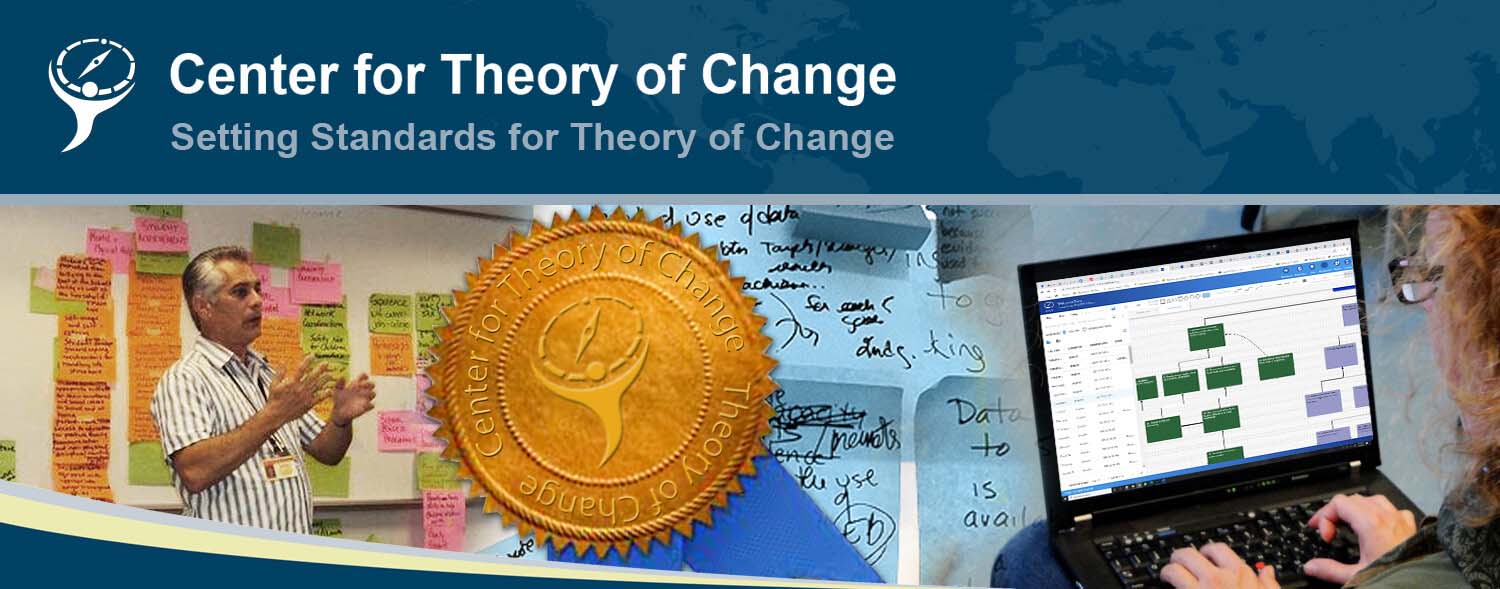TOC Origins
It is difficult to trace precisely when the term “theory of change” was first used, but a hint at its origins can be found in the considerable body of theoretical and applied development in the evaluation field, especially among the work of people such as Huey Chen, Peter Rossi, Michael Quinn Patton, and Carol Weiss. These evaluation theorists and practitioners, along with a host of others, have been focused on how to apply program theories to evaluation for many decades.
The stream of work leading to the use of theories of change in evaluation can be traced back to the late 1950s with Kirkpatrick’s ‘Four Levels of Learning Evaluation Model’. Further progress and evolution has included Daniel Stufflebeam’s CIPP (context, input, processes and products) and the widely used logical frameworks (logframes) or logical models which set out causal chains usually consisting of inputs, activities, outputs and outcomes coupled to long-term goals.
Methods such as logframes were a significant advance, providing a framework through which the relationships between a program’s components could be drawn out and articulated. However, US writers such as Weiss, Chen and Patton increasingly highlighted the challenges in evaluating complex social or community change programs when it was not clear precisely what the programs had set out to do or how and therefore difficult to evaluate whether or how they had achieved it (James, 2011).
One organisation which began to focus on these issues was the US based Aspen Institute and its Roundtable on Community Change. The work of the Roundtable led to the publication in 1995 of New Approaches to Evaluating Comprehensive Community Initiatives. In that book, Carol Weiss, a member of the Roundtable’s Steering Committee on Evaluation, hypothesized that a key reason complex programs are so difficult to evaluate is that the assumptions that inspire them are poorly articulated. She argued that stakeholders of complex community initiatives typically are unclear about how the change process will unfold and therefore give little attention to the early and mid-term changes that need to happen in order for a longer term goal to be reached. The lack of clarity about the “mini-steps” that must be taken to reach a long term outcome not only makes the task of evaluating a complex initiative challenging, but reduces the likelihood that all of the important factors related to the long term goal will be addressed (Weiss, 1995).
Weiss popularized the term “Theory of Change” as a way to describe the set of assumptions that explain both the mini-steps that lead to the long-term goal and the connections between program activities and outcomes that occur at each step of the way. She challenged designers of complex community-based initiatives to be specific about the theories of change guiding their work and suggested that doing so would improve their overall evaluation plans and would strengthen their ability to claim credit for outcomes that were predicted in their theory. She called for the use of an approach that at first blush seems like common sense: lay out the sequence of outcomes that are expected to occur as the result of an intervention, and plan an evaluation strategy around tracking whether these expected outcomes are actually produced.
Since the publication of Weiss’s book, the use of planning and evaluation using theories of change has increased exponentially among philanthropies, government agencies, international NGOs, the UN and many other major organizations in both developed and developing countries. This has led to new areas of work, such as linking the theory of change approach to systems thinking and complexity. Change processes are no longer seen as linear, but as having many feedback loops that need to be understood. Theories of change are strengthening monitoring, evaluation and learning. They are also helping to understand and assess impact in hard to measure areas, such as governance, capacity strengthening and institutional development. Innovations continue to emerge.
Despite the growing ubiquity of theory of change however, especially in the development arena, understanding of the approach and the methods necessary to implement it effectively are not uniform. In fact, there is evidence of some confusion about what the term ‘theory of change’ actually means and in some cases what some program developers describe as theories of change are in essence simply log frames or other approaches that do not encompass the complexity of the theory of change approach.
In this context, ActKnowledge, a social enterprise based in New York City, has been one of the pioneers in the conceptual development of Theory of Change and in developing various guides and supports necessary for the implementation of the Theory of Change approach to an agreed standard. This has included the development of Theory of Change On-line (TOCO), a tailor made software tool. Other important conceptual work included recent work by Sue Funnell and Patricia Rogers (2011) and guides by organisations such as GrantCraft.
References and Resources
ActKnowledge (2003). Tips and Challenges on Team Building with Theory of Change.
Funnell, Sue C and Particia J Rogers (2011). Purposeful Program Theory: Effective Use of Theories of Change and Logic Models.
Grantcraft (2006). Mapping Change: Using a Theory of Change To Guide Planning and Evaluation.
James, Cathy (2011). Theory of Change Review: Report Commissioned by Comic Relief. http://mande.co.uk/blog/wp-content/uploads/2012/03/2012-Comic-Relief-Theory-of-Change-Review-FINAL.pdf
Organizational Research Services (2004). Theory of Change: A Practical Tool For Action, Results and Learning Prepared for the Annie Casey Foundation. http://www.aecf.org/upload/publicationfiles/cc2977k440.pdf
Weiss, Carol (1995). Nothing as Practical as Good Theory: Exploring Theory-Based Evaluation for Comprehensive Community Initiatives for Children and Families in ‘New Approaches to Evaluating Community Initiatives’. Aspen Institute.
WK Kellogg Foundation 2004. Logic Model Development Guide. WK Kellogg Foundation. Michigan.
Taplin, Dana, Heléne Clark, Eoin Collins and David L. Colby (2013). Theory of Change Technical Papers: A Series of Papers to support Development of Theories of change Based on Practice in the Field. ActKnowledge: New York.
Theory of Change tools and training materials are available on the Theory of Change website, a joint venture between the Roundtable and ActKnowledge: www.theoryofchange.org.
